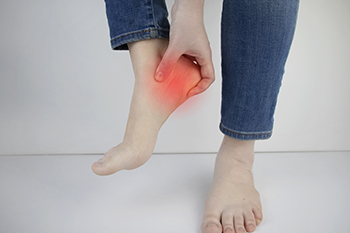
Plantar fasciitis develops as a result of an inflamed plantar fascia, which is the band of tissue that connects the heels to the toes and runs along the bottom of the foot. The fascia can become irritated for several reasons. These include obesity, standing on hard surfaces for long periods of time, and wearing shoes that do not fit correctly. Research has indicated that cases of plantar fasciitis have increased during the pandemic. This may be a result of more people walking or running outside on uneven surfaces when the gym was closed. Additionally, it is a possibility that flip-flops were worn most of the day while working remotely. These types of shoes have little or no arch support, which may be a contributing factor in developing plantar fasciitis. This condition can produce uncomfortable heel pain, and mild relief may be found by stretching the plantar fascia and Achilles tendon. Many patients have found it helps to wear shoes that offer good support. If you have this ailment, it is suggested that you are under the care of a podiatrist who can guide you toward the correct treatment.
Plantar fasciitis is a common foot condition that is often caused by a strain injury. If you are experiencing heel pain or symptoms of plantar fasciitis, contact Jeffrey L. Bober, DPM from Maryland. Our doctor can provide the care you need to keep you pain-free and on your feet.
What Is Plantar Fasciitis?
Plantar fasciitis is one of the most common causes of heel pain. The plantar fascia is a ligament that connects your heel to the front of your foot. When this ligament becomes inflamed, plantar fasciitis is the result. If you have plantar fasciitis you will have a stabbing pain that usually occurs with your first steps in the morning. As the day progresses and you walk around more, this pain will start to disappear, but it will return after long periods of standing or sitting.
What Causes Plantar Fasciitis?
- Excessive running
- Having high arches in your feet
- Other foot issues such as flat feet
- Pregnancy (due to the sudden weight gain)
- Being on your feet very often
There are some risk factors that may make you more likely to develop plantar fasciitis compared to others. The condition most commonly affects adults between the ages of 40 and 60. It also tends to affect people who are obese because the extra pounds result in extra stress being placed on the plantar fascia.
Prevention
- Take good care of your feet – Wear shoes that have good arch support and heel cushioning.
- Maintain a healthy weight
- If you are a runner, alternate running with other sports that won’t cause heel pain
There are a variety of treatment options available for plantar fasciitis along with the pain that accompanies it. Additionally, physical therapy is a very important component in the treatment process. It is important that you meet with your podiatrist to determine which treatment option is best for you.
If you have any questions, please feel free to contact our office located in Glen Burnie, MD . We offer the newest diagnostic and treatment technologies for all your foot care needs.
